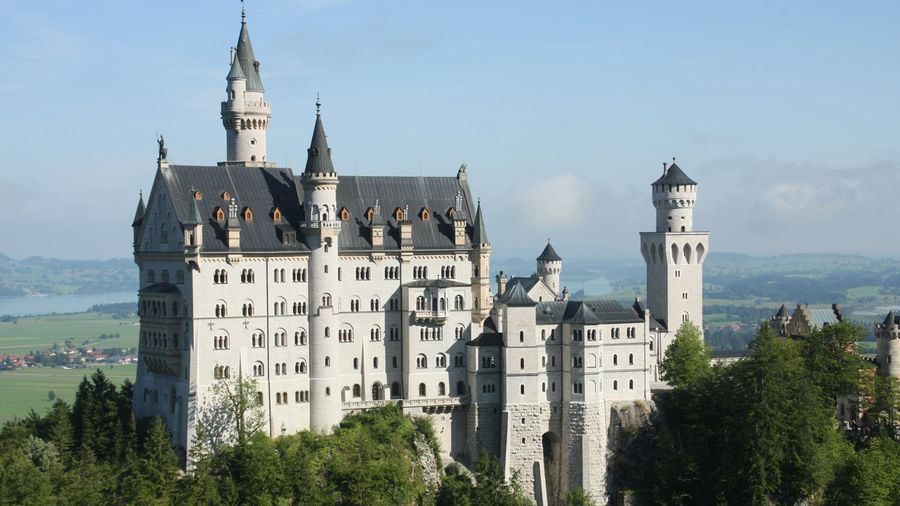
Füssen
Nestled at the foot of the Bavarian Alps, Füssen is a picturesque town that feels like something out of a storybook. Known for its cobbled streets, stunning alpine scenery, and rich history, Füssen is also the gateway to some of Germany’s most iconic landmarks, including the world-famous Neuschwanstein Castle. With its medieval charm, fascinating historical significance, and beautiful natural surroundings, Füssen is a must-visit destination for anyone exploring southern Germany.
A Historical Crossroads: From Roman Times to the Bavarian Kingdom
Füssen’s history stretches back over two millennia, beginning as a Roman military outpost along the Via Claudia Augusta, a major trade route between Italy and Germany. The town flourished during the Middle Ages, becoming an important center for arts, culture, and religion. By the 8th century, Füssen had developed around the Hohes Schloss, or High Castle, which served as the seat of the local bishops and a symbol of the town’s power and influence.
In the 16th century, Füssen became known for its craftsmanship, particularly in the manufacture of lutes and violins, earning the town a reputation as a center for musical instrument production. Füssen’s connection to Bavaria deepened over the centuries, and today, the town is known for its role in shaping the region’s cultural heritage.
Top 5 Unique Characteristics of Füssen
1. Neuschwanstein Castle
Füssen is best known as the gateway to Neuschwanstein Castle, one of the most famous castles in the world. Built by King Ludwig II of Bavaria in the 19th century, this fairytale-like castle is perched on a hill overlooking the town. With its soaring towers and turrets, Neuschwanstein is said to have inspired Walt Disney’s Sleeping Beauty Castle. Visitors can tour the opulent interiors, admire the sweeping views of the surrounding lakes and mountains, and learn about the fascinating life of King Ludwig, often referred to as the "Mad King" for his eccentricity.
2. Hohes Schloss (High Castle)
Füssen’s Hohes Schloss is a striking medieval fortress that dominates the town’s skyline. Once the residence of the bishops of Augsburg, the castle is a stunning example of Gothic architecture with its colorful façade and intricate frescoes. Today, it houses a branch of the Bavarian State Collections of Paintings and offers panoramic views of the town and the Alps from its towers. The Hohes Schloss is a key symbol of Füssen’s historical significance and medieval legacy.
3. St. Mang’s Abbey
Adjacent to the Hohes Schloss, St. Mang’s Abbey is a Benedictine monastery that dates back to the 8th century. The abbey, named after St. Magnus, one of Füssen’s patron saints, played a vital role in the town’s religious and cultural life. Visitors can explore the Baroque-style basilica, with its lavish interior and impressive frescoes, as well as the abbey’s museum, which provides insight into the history of the region and the monks who lived there. The Füssen Heritage Museum, located within the abbey, offers a fascinating look at the town’s past.
4. Forggensee and the Alpine Landscape
Füssen is surrounded by breathtaking natural beauty, with the Forggensee lake and the Bavarian Alps providing a stunning backdrop. Forggensee, one of the largest lakes in Bavaria, is a popular destination for outdoor activities, including boating, swimming, and cycling. The nearby mountains offer hiking trails for all levels, with views of lush valleys, alpine meadows, and snow-capped peaks. Füssen’s location makes it an ideal base for nature lovers looking to explore the Bavarian Alps.
5. Music Tradition and the Füssen Violin School
Füssen has a long-standing tradition of musical craftsmanship, dating back to the 16th century when it became a center for the production of lutes and violins. The town was home to one of Europe’s first violin-making schools, and Füssen’s luthiers were renowned for their skill. Visitors can learn more about this tradition at the Füssen Heritage Museum, where displays of historical instruments and tools offer a glimpse into the town’s musical legacy.
Füssen Today: A Blend of History and Nature
Today, Füssen is a thriving destination that combines its rich history with modern tourism and outdoor adventure. Visitors come to Füssen not only for its historical landmarks, such as Neuschwanstein Castle and Hohes Schloss, but also for its proximity to the Bavarian Alps and the surrounding lakes, which offer a range of recreational activities throughout the year. In the summer, Füssen is a paradise for hikers and cyclists, while in the winter, it attracts skiers and snowboarders to its nearby resorts.
Despite its small size, Füssen offers a lively cultural scene, with traditional Bavarian festivals, concerts, and markets that celebrate the region’s heritage. The town’s charming old town, with its quaint shops, cafes, and restaurants, is the perfect place to relax and enjoy the beauty of southern Germany.
Fun Facts About Füssen
Füssen is located at the southern end of the Romantic Road, one of Germany’s most famous scenic routes.
The Hohes Schloss features trompe-l'œil (optical illusion) frescoes on its exterior walls, making the flat surfaces appear three-dimensional.
Füssen’s Forggensee is actually a man-made reservoir created in the 1950s and is drained every winter for maintenance, revealing the old Roman road beneath it.
King Ludwig II never saw the completion of Neuschwanstein Castle—he died under mysterious circumstances before its full completion.
Füssen has a population of just over 15,000, but it attracts hundreds of thousands of visitors each year due to its historical and natural attractions.
From its majestic castles to its alpine adventures, Füssen is a destination that offers a perfect blend of history, culture, and natural beauty. Whether you’re exploring medieval fortresses, hiking through the Bavarian Alps, or immersing yourself in the town’s musical heritage, Füssen provides an unforgettable experience in one of Germany’s most enchanting regions.